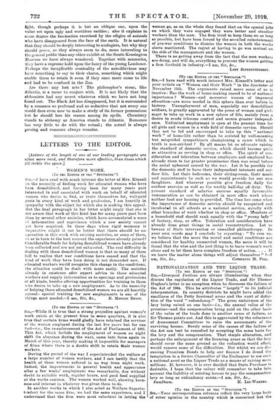[To THE EDITOR OF THE " SPECTATOR.")
8114—While it is true that a strong prejudice against women's work exists at the present time in some quarters, it is also true that certain firms would gladly have retained the services of the women employed during the last five years but for one fact—i.e., the re-enforcement of the Act of Parliament of 1901. This Act, which forbids the employment of women on night shift (in abeyance during the war), came into force again in March of this year, thereby making it impossible for managers of firms where there is a double shift to retain their women workers.
During the period of the war I superintended the welfare of a large number of women workers, and I can testify that the health of these women suffered in no way from night work. Indeed, the improvement in general health and appearance after a few weeks' employment was remarkable, due without doubt to suitable work, regular hours, and good food supplied at the works canteen. The women worked well, showing keen- ness and interest in whatever was given them to do.
In another works in which I also acted as Welfare Superin- tendent for the same firm, we had the same experience, and I understand that the firm were most reluctant in letting the women go, as on the whole they found that on the special jobs on which they were engaged they were better and steadier workers than the men. The firm tried to keep them on as long as possible, but have been forced by the so-called reinstatement of pre-war conditions to dismiss the women in both the works above mentioned. The regret at having to go was mutual on the side of the management and the women.
There is no getting away from the fact that the men workers are doing, and will do, everything to prevent the women getting a firm foothold in industry.—I am, Sir, he.,
LADY SUPERINTENDENT.










































 Previous page
Previous page